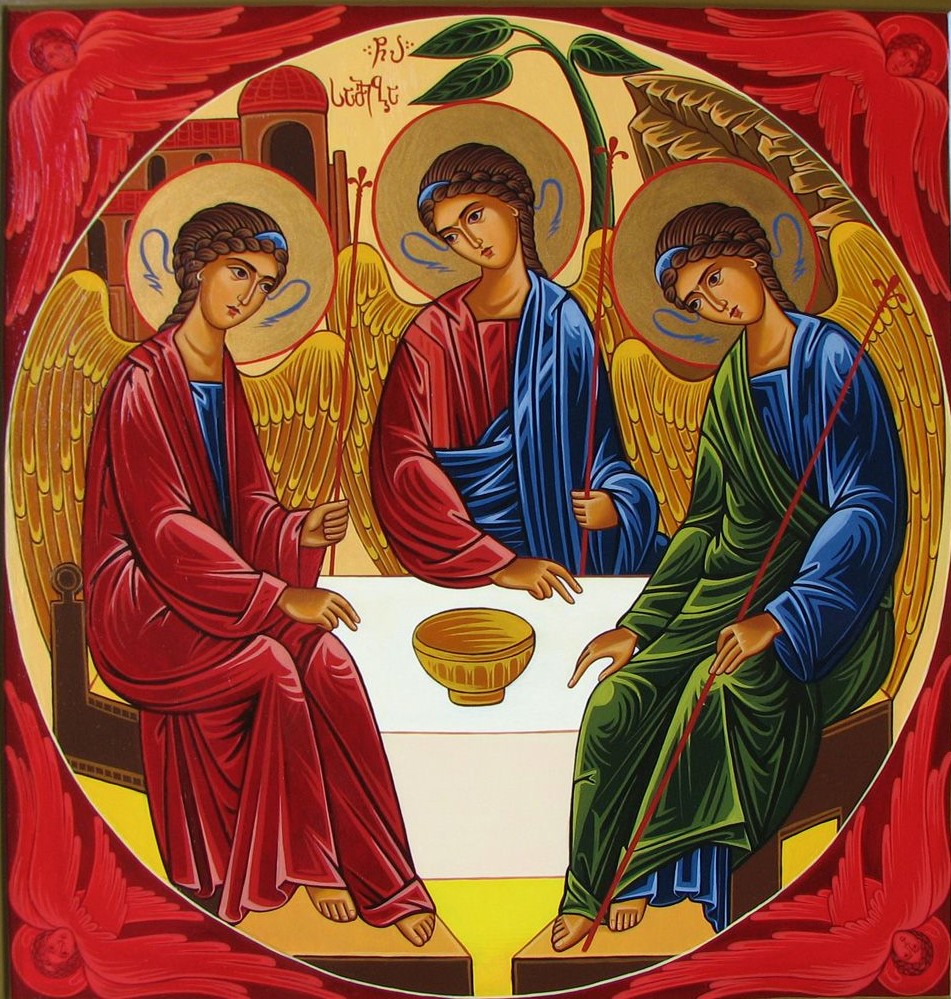|
Listen to this post:
|
Last time, we saw my friend Sklyar McManus charge that my analysis of what counts as a unitarian view is obviously wrong, as it would allow in any view which asserts that the one true God just is the Father. But this is what my analysis is:
a ‘unitarian’ Christian theology asserts that the (1) there is one God, (2) who is numerically identical with the one Jesus called ‘Father’, (3) and is not numerically identical with anyone else, (4) and (1)-(3) are eternally the case.
He’s unaccountably left out requirement (3), which correctly excludes many from counting as unitarians.
- A Oneness person may believe that the Father just is (is numerically the same as) God, but he can’t be a unitarian if he also thinks that the Son just is God.
- Again, a confused trinitarian may look at a chart like this, and believe that the Father just is God. But that doesn’t make him a unitarian Christian, for on the same grounds he’ll think that the Son just is God and that the Spirit just is God. (Even though the Father, Son, and Spirit are non-identical – which is why he’s confused.)
- Again, there might be a “binitarian” who thinks that the Father just is God, the Son just is God, and no one else is. But such a person wouldn’t be a unitarian either.
McManus then tries to show that my scheme mis-classifies the views of some Historical Greats:
To begin, let’s consider Aquinas and Augustine. Tuggy doesn’t weigh in on whether Aquinas is a one-self or three-self Trinitarian
To me Aquinas is an abyss of unclarity on this topic. I have tried hard to come up with a coherent view in his writings, but have not succeeded in finding one.
. . . but he does say that Augustine is “arguably a one-self Trinitarian.”
That’s what many have thought, for a number of reasons, among them being that Augustine frequently addresses the God the Trinity in a I-Thou sort of way. But I think more fundamentally, Augustine is a negative mysterian about the Trinity.
Then McManus launches off on discussing these guys’ view that the Son and Spirit eternally get their divinity from the Father – so that maybe this explains why the three of them are (or compose?) one God. But I skip over most of this. Here’s the part where McManus goes in for the kill, arguing that my scheme would absurdly classify Augustine and Aquinas as unitarian theologians:
Now, for these illustrious theologians, is the Father a deity? Check. Is he an ultimate? Sure looks like it. Conjunction-junction… and there we have it: the conclusion at (5) is true. Augustine and Aquinas are unitarians, on Tuggy’s understanding of things. At face value, I wouldn’t have thought these men supported the UCA’s “one God” message.
No, again, this ignores that in my view believing that the Father just is God is not sufficient for being a unitarian, as I explained above. Nor is it clear that either of these identifies the one God with the Father, since each seems to think that the one God just is the Trinity. And this is so even though, yes, we can find places where they, following the pre-Trinty pattern (c. 180 – 360 A.D.), use the word “God” interchangeably with “the Father.” Many do this, following earlier sources, even while believing that the Trinity is the one God.
He then quotes Hasker arguing that “in the ancient Church” no one denied that Son and Spirit owned their existence to the Father. I doubt that; I would think that some of the modalistic monarchians would deny that. At any rate, I think this claim is neither here nor there, as concerns the topic at hand.
But our friend Skylar is on a bit of a roll here. He urges that I must say that even Hasker is a unitarian. He writes,
Hasker is a three-self Trinitarian, as Tuggy has said. Therefore, the Father is a self. And on Tuggy’s understanding of an ultimate, in addition to Hasker’s claims about the Father as the one who “brings about the existence of the Son and Spirit,” we get the premise that the Father is an ultimate. Therefore, from Tuggy’s own definitions of these concepts, the Father just is God even for Hasker. That makes Hasker, who’s supposed to be a three-self, tri-personal God Trinitarian, a unitarian.

We have to notice that a certain tempting response isn’t available to Tuggy here. He can’t cite his own work arguing that Hasker’s Trinity implies tritheism, and therefore Hasker is actually just inconsistent (like, as he’s told me, Basil being a “unitarian tritheist”). And the reason he can’t respond this way is precisely because of premise (1) of the argument we’re considering. Because of this premise (which again is Tuggy’s own belief), Hasker can’t be a tritheist in the first place: the Son and Spirit aren’t also ultimates. Only the Father is an ultimate, and therefore just is God.
What Tuggy has to do, it seems to me, is to say that, for Hasker, the Son and Spirit can’t have the benefit of being called “God.” On Tuggy’s own definition of God, it looks like Hasker is also a “subordinationist unitarian.” But again, I thought Hasker was supposed to be a three-self Trinitarian, not a unitarian.
This issues here get a bit convoluted, but I don’t see that there’s any trouble for my definition of unitarian here. And by the way, the issue isn’t “being called ‘God.'”
Hasker, because the precious Cappadocians thought this, denies that deity implies aseity. So in his view, there are three beings, each of which is fully divine. And so despite his intentions, he’s a tritheist – and the many gestures he makes in the direction of “divine unity” (that is, showing that somehow these Three amount to only one god) are ineffective. As both this reviewer and this reviewer of his book show, he only verbally saves monotheism.
I think this is what Skylar is getting it: in my view, Hasker’s Father has some things which are required to be a deity – both ultimacy and aseity – and Hasker thinks the Son and Spirit lack these qualities. So in my view, his Father is a god, but the Son and Spirit are not gods – they will be mere deities. So if he agrees that the one God just is the Father and no one else, then he might be a subordinationist unitarian like Clarke or Origen. But Hasker denies that the one God just is the Father! The reason is, as the title of his book suggests, that he thinks that the one God is the tripersonal God.
The only interesting truth nearby, I think, is that without too much adjustment, Hasker could switch from his “social” Trinity theory to a subodinationist unitarian theory. But he’d have to deny that “the Trinity” is the one God, affirm that the Father alone is God, and affirm that deity requires aseity. But he is way too Nicene and trinitarian to do any of those.
McManus sums up his indictment in this way:
I’ve gone on long enough, but the foregoing leads to these three options (or combination of them): (1) bite the bullet and admit these men really are unitarians; (2) reject Tuggy’s definition of “God”; (3) reject Tuggy’s definition of “unitarian.” It seems to me that (3) going to have the smallest cost for Tuggy.
Fortunately for me, I don’t need to do any of these things. My definition of the concept of a unitarian theology that so bothered Skylar comes out of all this unscathed, as best as I can tell.

All of this, remember, was to save “monarchical trinitarians” from the fate of being classified as a variety of unitarians. It’s all so they can avoid the ire of the U-word. But honestly, that word is just a description of their view that the one God just is the Father alone – a thesis they hold in common with many modern-era people who call themselves “biblical unitarians” or “unitarians” or “Arians,” and with many ancients commonly called “subordinationists.” To me, being called “unitarian” is a complement, not an insult. The label means that you agree with the New Testament about the one God. I understand that the word is odious in the sight of many. But I think that label for this sort of theology goes with accepting a powerful and principled, non-polemical system of classification.
Of course, Dr. Branson thinks he’s got a better scheme; this needs to be argued through in full. It needs to be shown which, if either, seems to correctly sort a wide range of theologies. So far, we’ve only seen that my controversial definition survives a good kicking.
